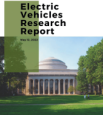
Electric Vehicles Research Report
As part of Fast Forward: MIT’s Climate Action Plan for the Decade, published in May 2021, MIT took on the challenge to join the world in finding equitable ways to bring every sector of the global economy to net-zero carbon emissions by 2050, adapt to the effects of climate change that cannot be prevented, “going as far as we can, as fast as we can, with the tools and methods we have now”. The Institute has pledged to reduce direct campus impacts on climate change by achieving net-zero carbon emissions by 2026, with a goal of eliminating direct emissions by 2050. This challenge encompassed the following electric vehicle centered goals:
• All future MIT fleet purchases of light-duty vehicles will be zero emission, subject only to availability.
• MIT will initiate the conversion of campus shuttle bus vehicles to zero-emission buses by 2026.
• MIT will increase campus car-charging stations by a minimum of 200% (from 120 to 360) by 2026.
The Electric Vehicles (EV) Research team, a group of three students who worked with MITOS to aid and further MIT’s progress on the EV front, as a segment of the Carbon Footprint Working Group, addressed this challenge systemically, recognizing the integrated nature of transitioning the fleet and shuttle system with the increased demands on EV infrastructure.
By collaborating with a group of EV Co-Leads, experts in the operational field, the EV Student Researchers analyzed the current state of MIT’s shuttles, Campus fleet, and charging infrastructure. Equipped with the necessary knowledge, the EV Student Researchers derived a series of recommendations for the execution of the three EV-centered goals, which will be explored throughout this report.


